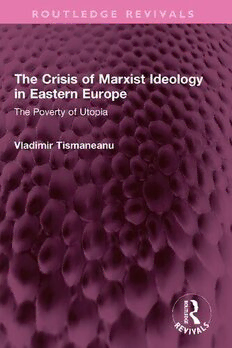
The Crisis of Marxist Ideology in Eastern Europe: The Poverty of Utopia PDF
Preview The Crisis of Marxist Ideology in Eastern Europe: The Poverty of Utopia
Routledge Revivals The Crisis of Marxist Ideology in Eastern Europe First published in 1988, The Crisis of Marxist Ideology in Eastern Europe states that since de-Stalinisation began in Eastern Europe, the ‘dead hand’ of institutional Marxism has been eroded by revisionist Marxism, with the turn to young Marx and the philosophy of human emancipation to undermine prevailing orthodoxies. But this revisionism clung to the old socialist dogmas and refused a total break with the system, and the effort eventually failed. The result was the emergence of a dissident counterculture rejecting the system entirely. Independent social movements (such as unofficial peace groups and trade unions like Solidarity) have given this counterculture a major role in Eastern Europe, whilst the ruling elites have responded with confusion. Tismaneanu concludes that the only hope for the anti-totalitarian intellectuals of Eastern Europe is to oppose the regimes with non-Marxist ideas – otherwise they will be permanently reduced to the status of a hope- less, albeit heroic minority. This book will be of interest to students of eco- nomics, political science and international relations. The Crisis of Marxist Ideology in Eastern Europe The Poverty of Utopia Vladimir Tismaneanu Firstpublishedin1988 ByRoutledge Thiseditionfirstpublishedin2022byRoutledge 4ParkSquare,MiltonPark,Abingdon,Oxon,OX144RN andbyRoutledge 605ThirdAvenue,NewYork,NY10017 RoutledgeisanimprintoftheTaylor&FrancisGroup,aninformabusiness ©1988V.Tismaneanu Allrightsreserved.Nopartofthisbookmaybereprintedorreproducedorutilisedin any form or by any electronic, mechanical, or other means, now known or hereafter invented, including photocopying and recording, or in any information storage or retrievalsystem,withoutpermissioninwritingfromthepublishers. Publisher’sNote Thepublisherhasgonetogreatlengthstoensurethequalityofthisreprintbutpoints outthatsomeimperfectionsintheoriginalcopiesmaybeapparent. Disclaimer The publisher has made every effort to trace copyright holders and welcomes correspondencefromthosetheyhavebeenunabletocontact. ALibraryofCongressrecordexistsunderISBN:0415004942 ISBN:978-1-032-45859-5(hbk) ISBN:978-1-003-37902-7(ebk) ISBN:978-1-032-45862-5(pbk) BookDOI10.4324/9781003379027 The Crisis of Marxist Ideology in Eastern Europe The Poverty of Utopia VLADIMIR TISMANEANU R London and New York First published 1988 by Routledge 11 New Fetter Lane, London EC4P 4EE Simultaneously published in the USA and Canada by Routledge a division of Routledge, Chapman and Hall, Inc. 29 West 35th Street, New York, NY 10001 Reprinted 1990 © 1988 V. Tismaneanu Printed in Great Britain by Antony Rowe Ltd Typeset by Pat and Anne Murphy, Highcliffe-on-Sea, Dorset All rights reserved. No part of this book may be reprinted or reproduced or utilized in any form or by any electronic, mechanical, or other means, now known or hereafter invented, including photocopying and recording, or in any information storage or retrieval system, without permission in writing from the publishers. British Library Cataloguing in Publication Data Tismaneanu, Vladimir The crisis of Marxist ideology in Eastern Europe: the poverty of Utopia 1. Eastern Europe. Marxism, to 1987 I. Title 335.4'0947 ISBN 0-415-00494-2 Library of Congress Cataloging-in-Publication Data ISBN 0-415-00494-2 Contents Acknowledgements Introduction 1 1 An Autopsy of Stalinism 8 2 Soviet Ideology and Eastern Europe 42 3 The Decay of Stalinism 61 4 The Search for Renewal 77 5 Poverty of Utopia 91 6 Reconstruction or Disintegration? 108 7 From Criticism to Apostasy 121 8 Peace, Human Rights, Dissent 160 9 Neo-Stalinism and Reform Communism 183 Epilogue 216 Index 226 Acknowledgements This book was completed during my stay as a Hooper Fellow in International Security Affairs at the Foreign Policy Research Institute in Philadelphia, where I found encouragement for inno- vative ideas, open-mindedness, and a constant interest in the dynamics of contemporary communism. Daniel Pipes, the director of FPRI and editor of Orbis, the institute's quarterly journal of world affairs, was particularly supportive in what looked like an interminable, labyrinthine project. My colleagues on the research staff were helpful with fresh insights about radical ideologies and their metamorphoses at the end of the 20th century. Parts of the manuscript were masterfully typed by Thelma Prosser. Eraj Shervani, my research assistant, accompanied me in countless bibliographical adventures. Bronwen Ewens and Mary Sladex patiently indexed this daunting onomastic encyclopaedia. Portions of this book initially appeared in Orbis and Problems of Communism, and the author is deeply indebted to the editors of these journals — John H. Maurer and JoAnn Tomazinis from Orbis, Wayne Hall and Sonia Sluzar from Problems of Communism — for their suggestions and the welcome improvement of my somewhat esoteric language. I must also mention fruitful dis- cussions on Marxism and its fate in East-Central Europe with Andrew Arato (New School for Social Research, New York), Richard J. Bernstein (Haverford College), Gyorgy Markus (University of Sydney, Australia), Ivan Volgyes (University of Nebraska), as well as the long dialogues in New York and Paris with the Hungarian dissident philosopher Caspar Miklos Tamas. Dorin Tudoran, the Romanian dissident writer, enlightened my understanding of the situation of the intelligentisa in the country where we were both born and, for better or worse, educated. Ferenc Feher and Agnes Heller (New School for Social Research) patiently reviewed the manuscript and helped me with most valuable suggestions. This study originated with my first Western contribution in Praxis International (October 1983), a journal which was then edited by Richard J. Bernstein and Mihailo Markovic. As always in these cases, the author assumes full responsibility for all the statements contained in his book. Last but not least, a special word of gratitude for David Groom, who generously
